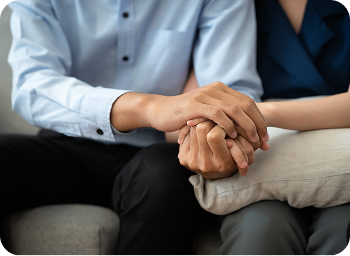
Q&A with Geoff: Is it Normal to Need Regular Reassurance in Marriage?
Question
Does a “normal”, or average, person need to be regularly reassured of a secure attachment in their marriage (like validation or seeking assurances of safety)? Or is that just something that occurs for those who’ve had attachment wounds?
Answer
Your questions reminds me of that old joke we’ve all heard:
Wife: “Honey, do you still love me?”
Husband: “I told you 30 years ago when we got married that I loved you…if that ever changes, I’ll let you know.”
Even though it’s exaggerated for effect, there’s something relatable to this interaction. How much reassurance do we need, especially if we have a partner who is steady? Most people side with the wife’s plight of needing reassurance that she still matters. However, if someone’s behavior is faithful and consistent, wouldn’t that be more important than words? This is a great question to explore.
In my 25 years as a therapist, I’ve worked with countless individuals who have reported similar interactions with their parent or spouse. They didn’t experience expressions of love and reassurance, but, rather, had to seek out their own evidence that they were loved. These conversations are often filled with uncertainty around the question of whether they’re too insecure or dependent for even needing this reassurance.
Most of us would agree that it would be neglectful and abusive to never show any physical or emotional affection to an infant or small child. In fact, in this scenario, we would probably agree that something was wrong with the adult for not providing reassurance and expressions love to the child. How else could a child know they mattered if it’s not spoken? We wouldn’t criticize the child for needing reassurance, as we’re all born completely helpless and rely on the primary attachment to our caregiver to not only physically care for us, but also express love to us.
So, here’s an important question: At what age do we stop needing that love and reassurance from our primary attachment figures? I think it’s safe to say that most people would agree that our primary attachment figures eventually need to pull away from providing physical care for us as we get older. They stop feeding us, cleaning us, and eventually will stop providing financially for us. We’re expected to move into more independence as markers of entering adulthood. It’s generally frowned on to see a fully capable adult still relying on these basic physical needs from their parent or primary attachment figure.
However, is there an age where we need to stop receiving love and reassurance? Is it immature and regressive to crave some level of love and reassurance from these primary attachment figures? Are we failing as adults if we still count on our primary attachments to show us love, affection, and reassurance?
The answer is simple and clear. We never outgrow our need to have a primary attachment to another person. If we were meant to stop needing a primary attachment figure in our lives, then none of us would feel drawn to romantically partner up with another adult. Of course, primary attachment as an adult does have some differences from the one-way dependency of a child to their parent.
We understand the need to provide constant reassurance to our children that we love them and that we’re there for them from the time they’re born. As they mature, they have an enlarged capacity to hold that reassurance in their minds and hearts without us constantly providing it for them. Of course, some children need more, and others need less, but parents are generally good at providing some level of reassurance and reminders that their children are loved.
As we reach adulthood, we strive to achieve a healthy balance of independence and dependency. The healthiest people know how to self-regulate and they also allow themselves to co-regulate with another person. For example, healthy co-regulation is when we allow our partner to soothe us with their touch.
It's common to struggle with getting the balance of self-regulation (independence) and co-regulation (dependence) just right. Sometimes we’re too independent and cut others off. Other times, we’re too dependent and overwhelm our partner. Finding that balance is the work of healthy adult romantic relationships and will change throughout the lifespan as each person has their own unique experiences.
So, do normal people need ongoing reassurance? Yes. It’s hard-wired in our biology to turn to another person for reassurance and support. It will show up in different ways, though, depending on lots of factors. For example, if you’ve been wounded in a close relationship, you may show up in the world more guarded and want everyone else to do the reassuring while you self-protect. Or, you might spend your energy checking your partner’s emotional temperature making sure they’re okay with you. You may have grown up in a family where reassurance was shown differently than your partner’s family. The ways we show up in our relationships varies, but we’re always seeking reassurance that we’re secure.
If the way your partner is needing reassurance is tough for you, it’s important to talk through how it impacts you. Just make sure you don’t treat the need for reassurance as the problem. You have the same need for reassurance. It just might show up differently for you. For example, your partner may need you to praise their efforts. You might need your partner to spend more time with you. There are countless ways we seek reassurance in our relationships. Pretending you don’t need relationship reassurance is a denial of your inborn attachment system. Stay in conversation with your partner about how you can help each other get the type of reassurance you need. It will help you both keep your emotional balance.



